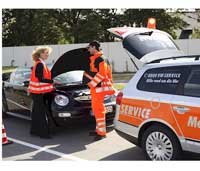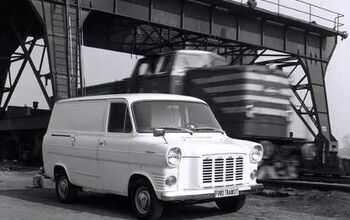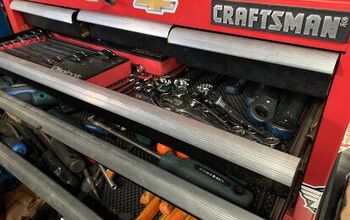Autobiography of BS : How I Drowned Dealers in Free Cash

One of my jobs was to create marketing programs for Volkswagen that drive their customers to Volkswagen dealers at regular intervals for scheduled service. It was in the late 80s. I presented a daring idea:
“How about we give the customer a free roadside assistance program if they come to the shop once a year?”
“Interesting. Run the numbers, come back and tell us more.”
Why would a car company care about how much service business is done at their dealers? If they don’t care, the car companies will go out of business. As anybody who really knows the car business knows: You don’t make money selling cars. The real money is made fixing them.
If a car dealer turns a profit, new car profit contribution is in the single digits. The real money is made back in the shop, on the used car lot, in financing (those were the days.) The same is true with a car maker. Believe it or not, when car makers still made profits, their fattest profits were made with their captive finance organizations and through parts sales.
If a car company is smart, it sees to it that their customer happily visits his dealer for scheduled service at regular intervals. The customer should leave with a smile, because a happy customer will return, create lots of fat profits, and eventually buy a new car. A pissed-off customer will desert to AutoZone, tell all his friends (or the world on TTAC) that he has been had, and take revenge by buying another brand at another dealer next time. The trouble is, neither the previous automaker nor the previous dealer will notice that the customer has left.
We ran the numbers. The numbers of actual breakdowns were pretty low. (Why do you think does AAA make fat profits on your $59?) Our customers drove mostly new cars which rarely broke down. Whatever broke down could usually be fixed on the spot. The really serious cases were few and far between, and we could splurge on them and treat them like royalty.
We came back with a juicy offer:
“Free roadside assistance!” (If you do your scheduled service as prescribed.)
“For the life of your car!” (They usually sell the new one after a few years.)
“Free loaner car!” (If we can’t fix the car the same day.)
“Free hotel room!” (If we can’t fix the car the same day and you won’t take the loaner.)
We didn’t hire a service organization or buy thousands of wreckers. At the time. we had 3500 dealers in Germany alone; one every five miles (on average). Properly organized, this would cost next to nothing. Actually, the true cost of the program came to less than $10 per car and year, most of it for the advertising campaign. It was charged to the dealer for every scheduled service, and the dealer hid the cost under “service parts and lubricants.”
The operative word was “properly organized.”
Trouble was, Volkswagen didn’t want to spend the money for a call center where you call in when you break down. This was the 80s. Call centers weren’t as prevalent as they are today. Most of all, a call center would have blown the less than $10/car per year budget.
“We don’t need a call center. They just call the next VW dealer and he will take care of them.”
“And at night? On weekends?”
“One of the dealers in the area will have standby duty.”
“Gentlemen, you need a call center. How’s the customer going to know who’s on standby?”
“We’ll give them answering machines! They will direct the customer to the dealer who’s on duty.”
“This will never work.”
“Bertel, you worry about the advertising. Leave the details to the grown-ups.”
And so, someone sold 3500 answering machines, and Volkswagen entered history as the first car company definitely in Europe, maybe even in the world, which provided free roadside assistance. Before, roadside assistance was the monopoly of the auto clubs. Again, we are talking 20 years ago. Today, free roadside assistance is standard with purchase, even in China.
We called it “Mobilitätsgarantie.” It rhymes with “Abwrackprämie” and translates to “Mobility Warranty”. We announced it with great fanfare. Stupid me didn’t recommend that we trademark “Mobilitätsgarantie”. It became a household word in Germany, and every new car from every manufacturer has one. Google shows more than 250000 entries. If I only had a penny for each car sold with a Mobilitätsgarantie , I wouldn’t be typing this.
Immediately, there were strong protests by the ADAC, Germany’s version of the AAA autoclub. They thought we wanted to put them out of business. Added PR for us.
Half a year into the program, great news: “It’s working unbelievably well! We have much fewer cases than we thought! We are way under budget!”
I liked to hear that, because we took the extra money and spent it on extra advertising. They had been a bit cautious in the beginning, worried they might drown in calls if they advertise it too much. With the new data, they opened the spigots and went all-out.
Top management also loved to hear the good news, because it proved again the unmatched reliability of a Volkswagen. They just won’t break down.
Funnily, our numbers were much lower than the breakdown numbers reported by the ADAC.
“Ah, they just get the old clunkers which are not serviced by our dealers. We have the new ones. Regular scheduled service. Proves our point. And who knows, they may fudge the numbers because they hate us.”
I suspected the truth: people couldn’t get through. No call received. No wrecker sent out in the middle of the night. No money spent. Trouble was, I couldn’t prove it. Volkswagen spent money on countless studies. They measured the satisfaction of people who received roadside assistance (high). But somehow, there never was a budget to study whether people could get through. I was alone with my suspicions.
For several years, I ended every presentation of a large campaign with a chart that said “We need a central emergency number.”
This always elicited smiles and applause all around the meeting room. Not because they wanted the central emergency number. Oh, no. Thumbs down on that. They clapped because they had learned that this was my last chart, and we could all go and have lunch.
So one day, my last chart did read: “We need a central emergency number, because:”
I had someone make an emergency call and tape it. I pushed the Start button of the tape machine. The voice began to tell the drama:
“It is 10 at night. I am dialing the first number of a Volkswagen dealer in the phone book.”
Ring. Ring. Ring. Ring. No answer.
“I am dialing the next number in the phone book.”
Ring. Ring. Ring. Ring. No answer.
“I am dialing the next number in the phone book.”
Ring. Ring. Ring. Ring. “This is your friendly Volkswagen Partner Fritz Müller. Our business hours are 9 to 5. If you need Mobilitätsgarantie roadside assistance, please call the on duty Volkswagen partner Hans Mayer at 123-4567.”
“I am calling 123-4567.”
Ring. Ring. Ring. Ring. “This is your friendly Volkswagen Partner Hans Mayer. Our business hours are 9 to 5. If you need Mobilitätsgarantie roadside assistance, please call the on duty Volkswagen partner Fritz Müller at 901-2345.”
As the tape ran, faces around the table turned from their natural pink to crimson.
“I am calling 901-2345.”
Ring. Ring. Ring. Ring. “This is your friendly Volkswagen Partner Fritz Müller. Our business hours are 9 to 5. If you need Mobilitätsgarantie roadside assistance, please call the on duty Volkswagen partner Hans Mayer at 123-4567.”
I was lucky that the chief of Volkswagen’s Customer Service Dept liked me, otherwise I would not have left the room alive.
“Stop it! We’ve heard enough!”
“Gentlemen: Give Bertel his damned central number.”
“And Bertel, please give me the damned tape.”
I handed it over.
“Any copies existing?”
“No, Sir.”
“Let’s hope none turn up. And now, let‘s have lunch!”
Finally, my central number was approved. The prefix for a toll free number in Germany was 0130 at the time. I got them a catchy, easy to remember number: 0130-9900. A call center was hired that had the home phones of the on duty mechanics. All was well.
I was happy and went back to my core business of creating masses of ads, posters, stickers, imprints in the car manual, all with the same number: 0130-9900.
A few months later, I was back at Volkswagen. Someone of their service department proudly gave me a stack of credit card sized cards. The card had 0130-9900 on it, and two real 10 Pfennig coins in it. This was before the Euro.
“Who made that for you?” I inquired.
“Merchandising company. Great deal. Only 25 Pfennig apiece.
“What do we need it for?”
“To publish your damned number! People put it in their glove compartment.”
“But why the coins?”
“For the payphone.”
“It’s a toll-free number.”
“You need the coins to place a call.”
“No, you don’t.”
“Yes, you do. They come back out at the end.”
“Down in the foyer is a payphone. Let’s go and check.”
With the guy in trail, I went down to the foyer. I picked up the receiver of the payphone. I did not insert any coins. I dialed 0130-9900.
“Volkswagen Mobilitätsgarantie. How can we be of assistance?”
My guy went pale.
“Please, can we keep this amongst us?”
“Sure, but I wouldn’t print any more cards.”
“Are you out of your mind? This is one of our most successful promotion pieces. We’ve sent out millions! Dealers order them by the thousands. At the rate we are going, soon each of the 15 million VWs on Germany’s roads will have two of those. 0130-9900 will be better known than directory assistance!”
“How many years do you have until retirement?”
“Two, why do you ask?”
“I wouldn’t print any more cards.”
All promotion material sent to dealers was free. They received an initial quantity and then could re-order whatever they needed. Careful statistics were kept on the re-order rate. The higher the rate, the more successful the promotion. Or so they thought.
We printed new cards without the coins.
They sent them out. The re-orders stopped dead.
You guessed it: The dealers had taken the coins out of the cards. Talk about free cashflow. There were stories of apprentices sitting around a table, popping coins out of the cards all day long under the watchful eye of the chief accountant.
I promised not to tell anybody. The matter was swept under the carpet.
The statue of limitation for coins in cards is covered with patina. My man has long retired. You’ve heard it here first. At thetruthaboutcars.
PS: A few years later, Germany received 800 toll-free service with vanity numbers. I immediately secured 0800VOLKSWAGEN for the VW Service Department. Higher-ups found out that the Service Dept. had that number, wanted it for themselves. “Can’t we use one simple number,” I pleaded. “If someone wants a catalog, send him a catalog. If someone needs help, send help.” Too simple. The Mobilitätsgarantie got its own number 0800VWSERVICE.

Bertel Schmitt comes back to journalism after taking a 35 year break in advertising and marketing. He ran and owned advertising agencies in Duesseldorf, Germany, and New York City. Volkswagen A.G. was Bertel's most important corporate account. Schmitt's advertising and marketing career touched many corners of the industry with a special focus on automotive products and services. Since 2004, he lives in Japan and China with his wife <a href="http://www.tomokoandbertel.com"> Tomoko </a>. Bertel Schmitt is a founding board member of the <a href="http://www.offshoresuperseries.com"> Offshore Super Series </a>, an American offshore powerboat racing organization. He is co-owner of the racing team Typhoon.
More by Bertel Schmitt
Latest Car Reviews
Read moreLatest Product Reviews
Read moreRecent Comments
- Ltcmgm78 Just what we need to do: add more EVs that require a charging station! We own a Volt. We charge at home. We bought the Volt off-lease. We're retired and can do all our daily errands without burning any gasoline. For us this works, but we no longer have a work commute.
- Michael S6 Given the choice between the Hornet R/T and the Alfa, I'd pick an Uber.
- Michael S6 Nissan seems to be doing well at the low end of the market with their small cars and cuv. Competitiveness evaporates as you move up to larger size cars and suvs.
- Cprescott As long as they infest their products with CVT's, there is no reason to buy their products. Nissan's execution of CVT's is lackluster on a good day - not dependable and bad in experience of use. The brand has become like Mitsubishi - will sell to anyone with a pulse to get financed.
- Lorenzo I'd like to believe, I want to believe, having had good FoMoCo vehicles - my aunt's old 1956 Fairlane, 1963 Falcon, 1968 Montego - but if Jim Farley is saying it, I can't believe it. It's been said that he goes with whatever the last person he talked to suggested. That's not the kind of guy you want running a $180 billion dollar company.




































Comments
Join the conversation
Indeed a great article, and this sounds like the federal government... Promote some new program and get elected on it, then raise the taxes to pay for the program but instead spend the tax money on promoting some other program to buy more votes. Now the only difference here with Volkswagen is that they actually have customers, unlike our federal government where we are all subjects. (sigh) Anyway, the last two Jeeps I bought had Chrysler's roadside assistance. During the second purchase I actually bothered to read the fine print that said that the tow would only be covered if it was warranty covered work. So really, who on the side of the road at 10 p.m. is going to try and figure out if their breakdown will be warranty covered?! So I'd still call AAA.
This piece is a prime example of why I love coming to this site.